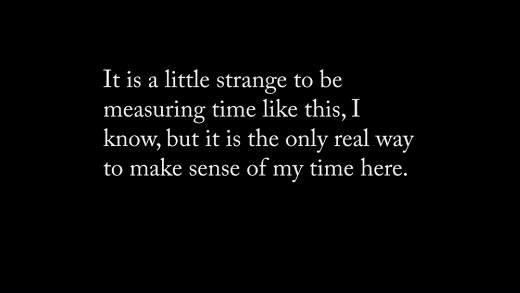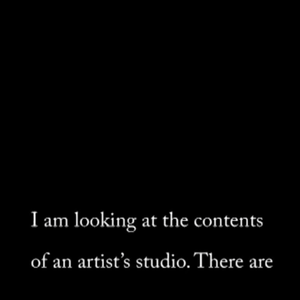Alex Davidson: Your work, The Aachen Faxes, is a piecing together of various correspondences between Julian Dashper and yourself, when Julian was on a residency in Aachen in 1995. The text is all Julian's voice; your responses to his messages are implied but not included. Obviously the title of the work tells us that these messages were sent by fax. It is interesting to think about this technology in terms of its obsolescence. Fax was somewhere between a phone call and a letter, and it has the brevity of instant messaging, but it also has the physicality of physical post. Perhaps you could begin by speaking about your editing process. Could you say a bit about the way in which you selected the material and put it together?
Marie Shannon: Being a good archivist, I started by photocopying all the faxes. I spent a bit of time reading them in chronological order, and thinking about them. I identified three broad categories of material I wanted to use—expressions of love; Julian's discussion of his situation as an artist in residence, which included his observations on the passing of time; and his instructions to me on jobs I was taking care of at home. I underlined every example of these three categories, each in a different colour, and then transcribed them, in each colour, into a word document. I then moved them around so there was a fairly even distribution of the three different kinds of text. Once I had done that, I made sure it retained a chronological integrity, where he was making direct reference to time and seasons. It was also important to include very specific references to real people, as a counterpoint to Julian's references to the fast and slow passing of time, and the sense that he is floating, suspended from his everyday life. Then I spent quite a bit of time moving things so the juxtapositions worked well. There had to be a natural play between the mundane, the emotional and the reflective. I also had to retain a sense of overall cohesion. One of the biggest challenges was to pare the material back as far as I did, but not so far that it evaporated.
The Aachen Faxes (2012) Marie Shannon
AD: There are several moments when Julian mentions the passing of time. Most often he writes about how time is passing very slowly, and how days feel like months, but he often adds that “he isn't having a bad time, just a slow time.” At one point it feels agonisingly monotonous, when he says: “It's just that I cannot remember a time when I marked the days off the calendar one by one each night.” When watching the video, I found my own sense of time stretched out to the degree that it was difficult to say how long I had been watching. There is a slowness to the work, which comes through a mixture of the drone-like cello and the white words which appear and disappear at a very steady, measured pace. How did you come to that musical composition?
MS: I'm not a musical person, so in many ways the composition was very easy. I knew I wanted a musical sound that was not lyrical—somewhere between an ambient drone and a tune. Something that was slow, and didn't go anywhere, or make any progression—as if it was always just starting. Julian's brother Mark plays the cello, so I asked him to be my cellist. I started the recording session by asking him to play a note on each string. I then chose the two middle strings, as I wanted a narrow dynamic range. I got him to play a few short runs on those two strings, and set a maximum high and low note for him to play within. So I asked him to play a range of notes on the two strings, within the bounds I had set, and to play slowly, with an even rhythm and frequent pauses. Because he's a musician, they were all proper musical notes, so they sounded good, and not jarring. The constraints I gave him prevented him from making significant lyrical and tuneful progressions (if he played for too long without pausing, he would start playing a tune or, at least, become lyrical and musical). The pauses were designed so I had space to easily cut and edit the piece, as well as to create a slow and repetitive ambience. What Mark came up with was pretty much exactly what I had imagined. The cello has (to me) quite a simple and linear sound—there is not a lot of fuss about it—so it is easy to hear in your mind. In the editing process, I did a lot of cutting and pasting, and there is quite a bit of repetition of a few passages. I was careful not to have the spaces in the music coincide too frequently or predictably with the fades to black between the text screens, as I wanted to avoid the implication that the music was a comment on, or a guide to, the text.
AD: It's really interesting to hear the way you negotiate the work's emotional charge; its capacity for quite a powerful affect, and more mundane, everyday forms of language. You seem to have done that both in the editing of the text and in the score. In the text, you construct a rhythm that intersperses romantic sentiment with very prosaic statements and questions. It jumps from sentences such as “I miss you very much and think about you all the time” to “have you taken up the hall carpet?” And in this way you interrupt any overidentification with the lyricism of the correspondence, bringing it back into the grind of everyday reality. This seems to be very close to the experience of longing, in that it is always an alternation between an ineffable, abstract collage of words and thoughts constantly and rhythmically cut through by the brute reality of our everyday existence in which we still must work, eat, be irritable, clean the bathroom, pull up the carpet... etcetera. The way you say you don't allow the music to progress into a recognisable pattern, or tune, that you divert it back into a discrete series of notes seems to follow the same kind of logic to the editing of the words; it is always injected with a healthy dose of the mundane, the less 'meaningful', before it becomes sentimental. A lot like lived experience; there is never a crescendo. Affect is seemingly always ultimately reigned in. Could you comment on how you see affect functioning in your work?
MS: I was aware that the larger context of Julian's no longer being here could be a strong subtext to the work, so I was very careful not to overplay the sentimental potential of the words. However, the expression of love is an important part of most people's lives, so we shouldn't be afraid of it. Yes—I deliberately used the conjunction of the 'sentimental' with the mundane or the funny to undercut or underplay it. I am also using the interplay of different kinds of statements or thoughts as a reflection of the way we can jump freely between such different levels of emotional/reflective/functional thoughts. We are not in one state at a time. I think, also, the connection to the everyday and the mundane underlines the emotional and the reflective parts. They are anchored by real activities.
AD: Julian's absence now is definitely a subtext to the work to those who knew or knew of Julian, which would be many members of the work's audience I imagine. The work has several mentions of New Zealand friends, colleagues and artists, and he also compares Aachen to Hamilton, saying “The only way to describe it is that it has the same feeling as Hamilton, except older”. I thought this reference was particularly funny, but it is also a very New Zealand-specific kind of humour. Since '95 travel has become relatively more common from New Zealand, yet Europe still holds a certain desirability for many. I kept thinking that his dry, comical reflections on Europe and comparisons to New Zealand referred to the little social, geographical and cultural differences rather than the bigger ones that are often—perhaps romantically—envied. He writes of differences in the weather, and in the characteristics of cats (!) several times. So the video speaks in different registers and to different audiences. There are these intimations that are just between you and him, I imagine, and then there are references that other friends might pick up, and then it also has a much broader relatability for people who know neither of you because of the universality of many of its themes; love, absence, and the difficulty of communication over distance for example. Were questions of audience important to you in making this work?
MS: I was less aware of audience when making the work (in terms of "pitching" it) than I was of the need to make a work that had integrity to the idea. I was very aware, however, of the specificity, whether to New Zealand, or to people we knew, whose identity could be guessed by some of the audience, as well as the more universal material. I believe very strongly, when writing, in keeping specific material intact, and not trying to make it more generally understood. I think there is a lot of character and texture in the specific, whether we understand it or not. I have always loved reading books that reference real places, whether they are big places, or tiny towns. It doesn't matter that the reader doesn't know them; getting a sense of them is part of the pleasure of reading. The writer needs to trust that the reader can figure things out. I felt that this work needed the specific references. It doesn't matter that we don't know who Gavin is, but the sense that he might be trouble is conveyed in the specific details, and the hint of his back-story—"I won't have anything to do with him financially." "I wonder how he will get on without his dog." Statements like that serve similar purpose to the comments about the mundane activities. "Yes—I forgot to say—put the $500 from the Falcon towards a new car." We can fill in the gaps, and the details are quite funny. I think it's important, in this work, that the general and the abstract are counterbalanced with the specific.
AD: Intimacy is communicated in different ways, and it also allows for different ways of communicating. Theorist Lauren Berlant writes about intimacy having the qualities of “eloquence and brevity”. Which is to say that closeness is about being able to communicate a lot with very little. The video is formally sparse; the score is pared back and the text is presented extremely simply. This mirrors the brevity of Julian's messages, but like his words, the work communicates a lot with a little. Could you say something about the way intimacy is coded and transformed in the work?
MS: I think the specifically intimate statements frame the other statements, so that we read the mundane or the abstract thoughts in the context of a conversation about love. I think the work represents the nature of a relationship—ideally even the most mundane conversations you have with the person you love are of a different nature than the mundane conversations you have with all the people you don't love.

